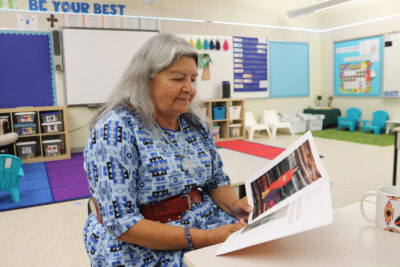Residential school survivor’s healing journey chronicled in new book
By Alejandra Pulido-Guzman on September 23, 2022.
 Herald photo by ALEJANDRA PULIDO-GUZMAN
Christina Fox looks at the page of her book that contains the applique that initiated the healing process which lead to writing My Suitcase.
Herald photo by ALEJANDRA PULIDO-GUZMAN
Christina Fox looks at the page of her book that contains the applique that initiated the healing process which lead to writing My Suitcase.LETHBRIDGE HERALDapulido@lethbridgeherald.com
An Elder from the Blood Tribe who is a teacher in Lethbridge has written a book about a suitcase that was part of her experience at a residential school and the healing journey that resulted from it.
Author of My Suitcase Nii Sookayis, Christina Fox, said she was working with some remnants when she realized she created an image that looked like her when she was young and it brought up a multitude of emotions. The appliqué she created reminded her of the time she spent in a residential school and the suitcase she never saw again.
“It took me a while, I sat there with it and I though ‘oh my gosh what is happening?’ I think I had a few tears there but I thought I wouldn’t be defeated. All of a sudden all this bottled up emotions came up but I put them aside,” said Fox.
She said after a week, she started taking notes and after a while she went back to her notes and realized her thoughts were heavy. It was then when she started sharing her story with a fellow teacher and friend Laurie McIntosh who supported her and accepted her, as well as inspired her to write the book.
“She totally accepted me and gave the strength and acceptance, she opened her heart to me and that’s how we started,” said Fox.
She said McIntosh suggested her story needed to be shared in the hopes that if she took that route, it would help her go through some more healing after developing her book.
“My feelings started to come out more and then I thought ok, I gotta be brave, I gotta pray about this to have the courage and be brave and just really share because… out there in the world I have sisters older than me, younger than me, young families I need to speak up for them,” said Fox.
She said she did not want to focus on what happened to them, but instead break that cycle and recapture their beauty as First Nations.
“I thought about all the beautiful traditional values that I was raised with, that my parents instilled in me. I was raised by my grandparents who I called Na’aa and Daa’da (mom and dad) and I’m not quite sure where it started, to actually start writing but it was amazing,” said Fox.
She said it was a painful journey, but it was meant to be for her to share and she is thankful that her prayers were answered and she was given the strength to put everything down on paper.
“It’s not gory enough for people to imagine what I must’ve went through, but to turn it around and help others to come back and be able to recognize their gifts and their talents even though it’s a tough journey, because I’m only one of many residential schools’ survivors,” said Fox.
She said it is unfortunate that she, like many others, did not have the chance to be a child. She says she was brought to that residential school and her chance at childhood was taken away.
“That’s what I had when I was brought to the door, I had a red dress on, the moccasins, the belt and my hair was super long and braided. So when I finished that appliqué all those emotions came up and I was all over the place,” said Fox.
Throughout the book, Fox showcases different appliqués that represent what she is talking about in that specific page, accompanied with personal photographs to give readers a glimpse into her life.
In one of the pages, the original appliqué of herself that brought up all the bottled up emotions is accompanied by an appliqué of the suitcase she carried with her to be dropped off. In it she had packed a brand new hair brush and a doll that was supposed to comfort her.
Fox said that once at the residential school, her suitcase was taken away along with her red dress and moccasins, and her long hair was chopped off, which was a way of removing her identity.
“Whenever I buy a new brush today it triggers,” said Fox.
She said at the age of 72, she can count with her fingers the times she has gone to a hair salon, because of the way her hair was chopped off while in the residential school, she has a hard time trusting anyone with her hair.
Fox said it is hard to think back about how her grandparents must have felt dropping her off, not knowing how many years would pass before seeing her again, or if they would see her again.
She said the residential school was an abuse from every angle but she is glad she is able to share her story now with others in the hopes of helping them heal as well.
“If I could help one person out there, I’ve done my work. I want to give them hope, I want them to live with pride. To be reminded of ‘ok this is where I came from’ and it might be a tough journey, but I can still say I am God’s child, a beautiful Indian girl, or First Nations or whatever, and I have gifts and talents,” said Fox.
She said she also hopes to educate others, and help eliminate the saying “why don’t they just get over it?”
My Suitcase Nii Sookayis is now available on Amazon.
Follow @APulidoHerald on Twitter
Follow @APulidoHerald on Twitter
27-26




